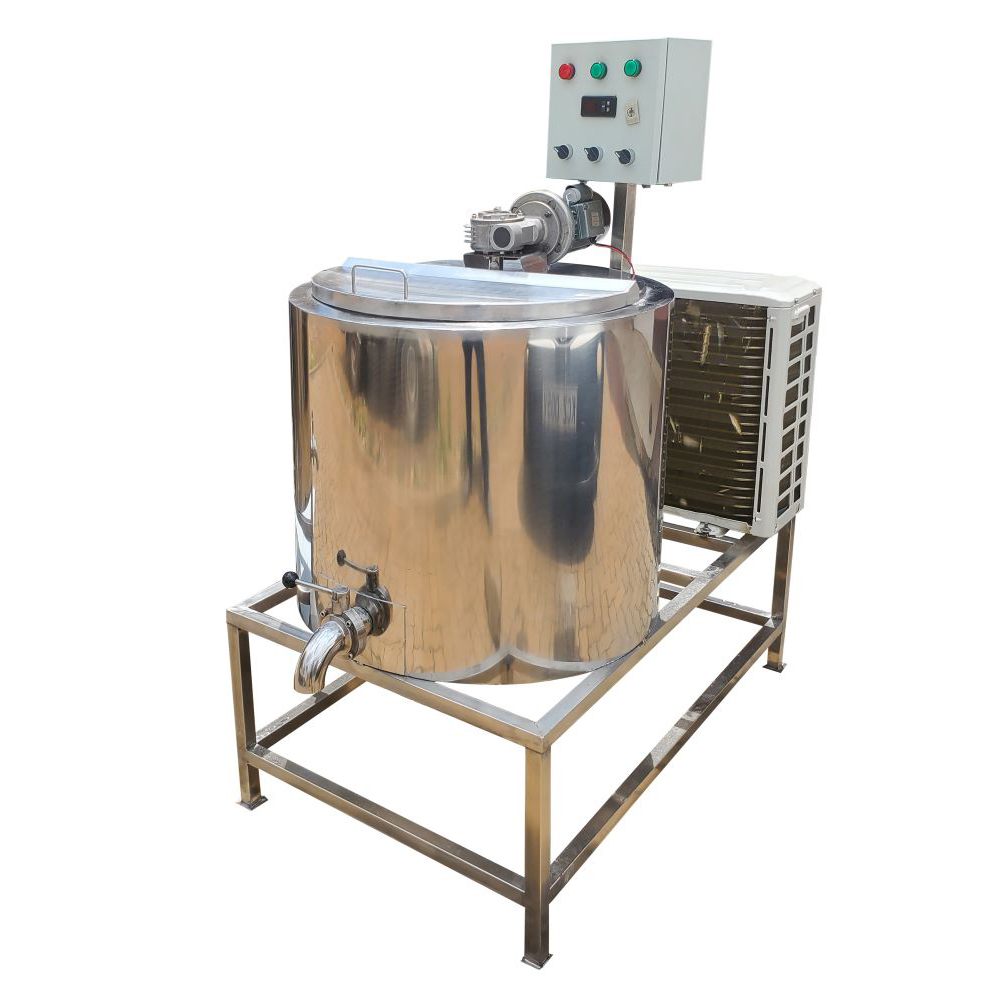A cooler/chiller is a refrigeration unit designed to rapidly cool down substances ie milk, juice etc.
Types of coolers/ chillers
- Immersion coolers
These coolers have a refrigeration unit that directly cools the milk
- Surface coolers
In these coolers use a refrigerated plate to cool the milk from outside
How a Cooler/Chiller Works:
- Rapid Cooling: After pasteurization, milk enters the cooler, where it is rapidly cooled by the cooler’s refrigeration system, bringing it down to the target temperature (around 4°C) quickly, within 1-2 hours, to maintain quality and prevent bacterial growth.
- Storage: Once cooled, the milk can be stored in the cooler until it is ready for packaging, transportation, or further processing. The cooler helps maintain a steady, safe temperature for milk until it’s handled or distributed.
What are the importance of using chillers or coolers in Kenya?
Using chillers or coolers in Kenya, particularly in the dairy industry, has several key importances that contribute to the safety, quality, and efficiency of milk production and storage. Here are the main reasons why they are essential:
- Prevents Milk Spoilage
- Milk is highly perishable, and without proper cooling, bacteria can grow rapidly, leading to spoilage. Chillers help reduce the milk’s temperature quickly after milking or pasteurization, preventing bacterial growth and extending the milk’s shelf life.
- Ensures Food Safety
- Rapid cooling helps eliminate the risk of contamination by harmful pathogens (such as Salmonella, E. coli, and Listeria), which can lead to foodborne illnesses. This is especially important in Kenya, where diseases from improperly handled milk can cause health risks to consumers.
- Maintains Milk Quality
- Cooling milk quickly after milking preserves its taste, texture, and nutritional value. Fresh milk that has been properly chilled retains its flavor and consistency, making it more appealing to consumers. It also maintains the milk’s vitamin content and protein structure.
- Compliance with Regulations
- The Kenya Dairy Board (KDB) has regulations that require milk to be cooled to a specific temperature within a certain time frame after milking. Using coolers ensures that milk meets these regulatory standards, helping farmers and processors comply with health and safety guidelines.
- Reduces the Risk of Off-flavors
- Milk that is not cooled quickly after milking can develop off-flavors and spoilage due to bacterial growth and fermentation. Chillers prevent this, ensuring that the milk maintains a clean, fresh taste and odor.
- Increases Shelf Life
- Proper cooling extends the shelf life of milk, allowing it to be stored for longer periods without compromising quality. This is especially crucial in Kenya’s rural areas, where transportation times to processing plants may be longer.
- Improves Dairy Productivity
- By using coolers, dairy farmers can store milk until it can be collected or processed. This allows for more flexible scheduling and can help increase the volume of milk that is collected or processed, leading to better economic returns for farmers.
- Boosts Market Access
- Proper cooling allows milk to be transported over longer distances without spoilage. This helps dairy farmers in remote areas of Kenya access larger urban markets, thus broadening their customer base and increasing profitability.
- Reduces Wastage
- Without adequate cooling, milk can spoil within a few hours, leading to significant losses. Chillers prevent waste by keeping milk fresh for extended periods, ensuring more milk is processed, sold, or consumed.
- Supports Small-Scale Farmers
- For small-scale dairy farmers in Kenya, using affordable and efficient cooling solutions (such as solar-powered coolers) allows them to store milk before selling it or transporting it to processing plants, helping to reduce losses due to spoilage and ensuring they get better prices for their milk.
- Energy Efficiency and Cost Savings
- Modern chillers, especially those that are energy-efficient or use solar power, can help reduce the operating costs of cooling milk in rural or off-grid areas. By keeping milk cooler for longer, these systems also minimize the need for frequent transport or re-processing.
- Helps in Value Addition
- Chilled milk is essential for making other dairy products such as yogurt, cheese, and butter. Chillers preserve the milk’s quality, allowing dairy processors to produce high-quality value-added products that can be sold in the market, adding economic value to the dairy sector.
Choosing the Right Chiller (Cooling Tank) for Your Dairy Business
Investing in the right chiller (cooling tank) is essential for the success of your dairy business. From preserving milk quality to meeting regulatory standards, the right cooling solution can make all the difference.
At Bonafine Trading Company, we’re committed to providing innovative, reliable, and energy-efficient cooling solutions to help your business thrive.
Don’t wait to optimize your operations. Contact Bonafine Trading Company today and take the first step toward enhancing your dairy business! Reach out to us on 0794 966 527 or write to us at info@bonafinetrading.co.ke

